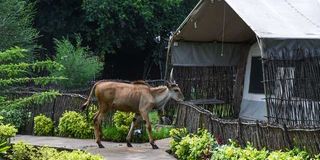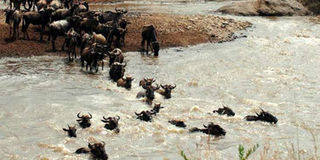Wildebeest migration left to lions and crocodiles of the Mara River

A resident hartebeest patronises the Nashulai Masai Conservancy camp inside the Masai Mara National Reserve. PHOTO | DIANA NGILA | NATION MEDIA GROUP
What you need to know:
- Employees in the tourism sector, bead makers, tour guides and other Kenyans would be making a kill from the innumerable guests visiting the vast reserve.
Mr Sindiyo says before the coronavirus pandemic, there were turbulent times that saw the number of guests reduce drastically.
In an ordinary year, this month would mark the onset of busy roads in and out of the Masai Mara Game Reserve in Narok, with tourists in a rush to behold the spectacle of wildebeest migration.
Employees in the tourism sector, bead makers, tour guides and other Kenyans would be making a kill from the innumerable guests — both local and international — visiting the vast reserve.
That changed. And now, dust has since settled on the murram roads and all that is left apart from the herd of wildebeest, are empty hotels and restaurants, worried sick staff and wildlife having their holiday in the human-deserted reserve. As it stands, everything is now nature’s affair.
At the entrance of the game reserve, businesspeople, who have mastered more than three foreign languages because of their constant interaction with tourists as they sold artefacts, are nowhere to be found.
The reserve, which has been a world famous safari destination since 1958 when it was established, has for the first time, ground to a halt because of coronavirus pandemic.
HUMAN ACTIVITIES
The scourge, which has affected the tourism sector in Kenya and the entire world, has rendered employees of the Mara Game Reserve jobless and desperate.
Mara Senior Warden James Ole Sindiyio says that for the first time, nature is taking a much deserved break from human activities.
“The animals are now at peace. They’re roaming freely and grazing without distractions, and they may be wondering what has happened that we (humans) were not there" Mr Sindiyo said.
The situation resulted from the cancellation of inbound flights that chopped off the number of tourists to the region. All hotels, lodges and restaurants closed indefinitely.
Mr Sindiyo says before the coronavirus pandemic, there were turbulent times that saw the number of guests reduce drastically.
“But it has never been like this. It’s the first time since the reserve was set aside exclusively for wildlife that activities have ground to a halt,” he said.

Masai Mara National Reserve Sekenani Gate entrance. Narok County governor Samuel Tunai summarised the lack of visitors with the phrase that animals are on holiday. PHOTO | DIANA NGILA | NATION MEDIA GROUP
Airstrips such as Keekorok, Serena, Olkiombo, Kichwa Tembo, Angama and Musiara, which serve more than 80 tented camps and lodges inside and outside the park, closed down business for an uncertain period with wild animals converting them into sun-bathing fields.
Narok Governor Samuel Tunai said the Mara has always had visitors.
PARK DESERTED
“The only time the park was nearly as deserted was during the 2007/2008 post-election skirmishes when tourist numbers fell drastically,” said governor Tunai, who is also the tourism and wildlife committee chairman at the Council of Governors.
Mr Tunai says the Narok government is the hardest-hit as it draws 80 per cent of its income from the game reserve that attracts millions of foreigners yearly, but this time there are none.
The absence of human beings in the park due to the Covid-19 crisis, though, is a blessing in disguise according to governor Tunai, who said the animals were getting a kick out of the situation and that they would have a chance to relax and multiply.
“This crisis will allow us to look at what we’ve been doing wrong. As custodians of the Mara, conservation comes first for us. Going forward, we might have to limit the number of visitors so that the animals are not disturbed,” he said.
Senior chief park administrator Christine Dapash says more than 250,000 people, who directly or indirectly depend on travel, have lost sources of livelihood now that all international passenger flights have been stopped and Kenyans told to stay indoors to beat Covid-19.
“All hotels in the Masai Mara closed three months ago and workers sent on unpaid leave. Despite the reserve itself being open for any visitor with measures by government put in place, no one is coming,” said Ms Dapash.
She says in most lodges and tented camps, only two cleaners, a chef and two security personnel were being retained with the rest of the workers, including some managers and those working in the accounts departments, having to stay at home.

Thousands of Wildebeest cross River Mara on June 9, 2016 to usher in the tourists' peak season in the world famous Maasai Mara Game Reserve.
PHOTO | FILE | NATION MEDIA GROUP
Maasai women, who have been a common feature at Sekenani, Ololaimutia and Musiara gates, selling beads and other bead work designs have no reason to show up.
All curio shops and outlets along the Narok-Mai Mahiu, in Narok Town and Ewaso Nyiro trading centres have closed and tourists who used to have excursions in cultural villages (manyattas) along the Narok-Sekenani Gate stopped visiting. Now, women and children begging for food and money from well-wishers is a common sight.
CLOSE DOWN
“Curio businesses, bead-work and cultural manyattas have been low since January when coronavirus spiralled out of China. During low seasons, we depend on tourists from China and other countries in Asia.
“Now that the virus has spread to all parts of the world, we have been forced to close down,” Mr David Sasine, a cultural ambassador at the Mara Sarova camp, said.
Naboisho conservancy representative Daniel Ole Muli, also lamented lack of market for the women who do bead-work and sell it to tourists who flock the Masai Mara.
“Besides getting income from the conservancies, our mothers earned a lot of money from bead-work. The youth also got a lot of money from entertaining the guests with our traditional songs, but all have been thrown into disarray by the pandemic” said Mr Ole Muli.
Roads in the park are always under maintenance for ease of movement of tour vehicles, but some are now flooded following heavy rains that have been pounding the area. With most workers sent home, maintenance stopped and many areas of the reserve are inaccessible.
According to the Mara Triangle CEO Brian Heath, there were fears that if the rains continue, the roads might be rendered impassable.
“Most of the lodges have closed shop, and we have sent all workers home except a few here and there, but we are almost overwhelmed by the roads maintenance due to the lean staff,” said Mr Heath.
The community neighbouring the reserve and who leased their land to the conservancies are also feeling the heat as some payment rates have been cut by half.
Conservancies chairman Francis Ole Nkoitoi lamented that because of the pandemic, members of Naboisho and Koyiaki conservancies have had their lease rates reduced by half.
He said members who had secured loans from financial institutions were now in a dilemma as they cannot service them because most were pastoralists who do not practice farming especially due to the high number of wild animals in the reserve.
“The members would receive between Sh7,000 to Sh92,000 per month depending on the land acreage given to the conservancies. However, this has now been reduced to a half, thereby affecting their livelihood,” Ole Nkoitoi said.
WILDEBEEST MIGRATION
Ms Jane Moniko of Sikinani Village has always looked forward to the annual wildebeest migration spectacle. But this year, things are different.
She is among villagers of Sikinani who are receiving weekly food supply from Mr Nelson Ole Reyia, 46, a volunteer who is feeding people whose livelihoods were affected by Covid-19.
Mr Reyia, the founder of Oldarpoi Mara Camp, and his wife Margaret, have been supplying foodstuff to villagers on the Nashulai conservancy over the last two months.
Mr Reiya, a former tour guide and a college lecturer, says he embarked on the initiative after tourism sector, Mara’s mainstay, nosedived in mid-March following a ban on flights.
Twice every month, each household gets eight kilogrammes of sifted wheat flour, two kilogrammes of sugar, a kilogramme of cooking fat and two kilogrammes of beans, all amounting to Sh2,000.
Like other women who used to sell their wares at the Sekenani Gate, Moniko is now forced to stay at home and wait for food donation from well-wishers and from her Nashulai conservancy, which, for the last three months, have been feeding over 5,000 residents.
“I had bought beads and materials ready to make many ornaments that I could sell. I’ve been preparing since January, but now I’m grounded,” Ms Moniko a mother of six says.
The local community depended on tourism at the game reserve where they worked as tour guides and drivers, waiters, conservancy owners and small traders.
Ms Rose Sairowua, a bead-work production manager at The Maa Trust, a local non-profit organisation, said about 700 women are contracted by the organisation to make bead-work crafts, which the organisation buys from them and sells to curio shops in the lodges.
“We have about 17 women groups in conservancies near Masai Mara, who depend solely on bead-work. Right now, they have no work, meaning, there’s no income for them,” Ms Sairowua said
Ms Sairowua said they would make up to Sh30 million from the sale of the artefacts annually. However, with Covid-19, they have nothing to smile about. A local investor in the hospitality industry, Mr Anto Tira, who is the founder and chief executive officer of Matira camp inside the game reserve, says they always use the high season between June-October to make profits due to the number of tourists who visit the facility every year.
“We have been closed for the last three months, and we have no visitors in our tented camp. We’re now counting a lot of losses. We can’t pay our staff and we were forced to send them home,” Mr Tira said.
For years, Mr Barnabas Shisanya, who works at the Fig Tree Camp, has been flying tourists daily in a hot-air balloon.
His day used to start at 5am when he drove to a launch site and joined crew members, who assembled, inflated, chased and packed up the balloon after landing, but for months. This has not happened due to the pandemic.
He has now decided to go back to his home in western Kenya, even as he ponders his next move. The hope everywhere is that the virus menace will go away soon for life to back to normal.


